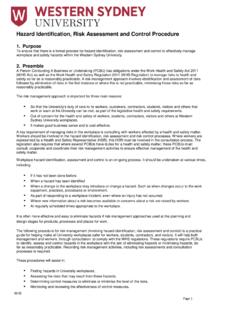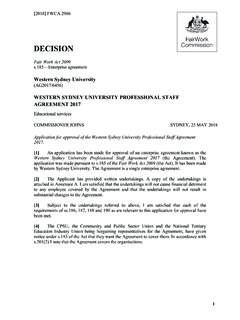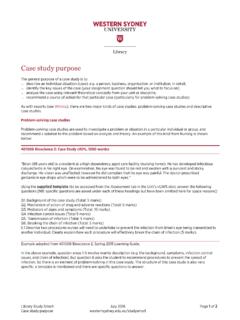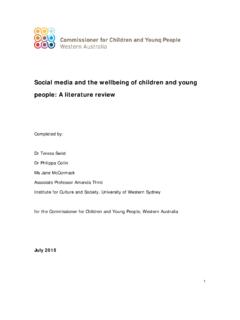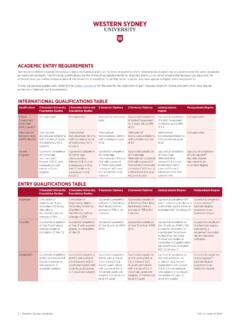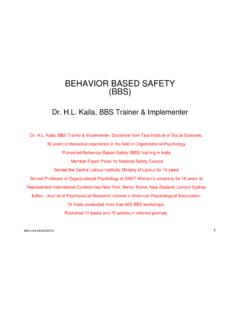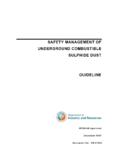Transcription of WHS CONSULTATION - Western Sydney University
1 Background Effective CONSULTATION is a key requirement of the University s WHS management syst em and a legisl ative requirement under the work Health and Safety Act, 2011 (WHS Act ). As a Person Conduct ing a Busi ness or Undertaking (PCBU), the University has a duty to consu lt workers on matters affecting their work health or sa fety. The University has a range of CONSULTATION mechanisms available to meet this duty and further details about these CONSULTATION arrangements are provided below. The University aims to provide an effective and effici ent forum for sharing and engaging with workers on work health and safety matte rs through these CONSULTATION arrangements.
2 Objectives of WHS CONSULTATION The University is co mmitted to ensuring the provisi on of sa fe workplace s and preventing injury and ill ness to workers. Worke rs incl ude employees, co ntract ors, temporary or casual staff, students on work experience, and volunteers. Where the University and another PCBU both hold a duty to consu lt workers, the University will endeavour to consu lt, cooperate and coordinate with the other PCBU about WHS matters. The University will consult with workers who are affected by health and sa fety matters. This incl udes when: - Identifying hazards, assessing risks arisi ng from work and making decisi ons about eliminating or minimisi ng those risks.
3 - Making decisi ons about the adequacy facilities for workers welfare. - Proposi ng changes that may affect the health and safety of workers. - Making decisi on about procedures affe ct ing the health and safety of workers incl uding procedures for consulting workers, monitoring the health of workers, monitoring workplace conditions and providing training or information to workers. The CONSULTATION undertaken should incl ude that: - Information is sh ared about health and sa fety matters between the University and workers. - Worke rs have opportunity to express their views, raise issues and contribute to the decisi on making proce ss about health and safety matters.
4 - The views of workers are taken into account by the University . - Worke rs are advise d of the outco mes of the CONSULTATION in a timely manner. WHS CONSULTATION work Groups The WHS Act allo ws for workers to be grouped into work groups for the purpose of electing representatives from the group and to determine which methods of co nsu ltation will be used by the group. A work group may be a group of workers with simila r WHS concerns and conditions. work groups are formed by negotiation and agreement between the University and workers. At the University WHS consu ltation has been developed to cover multiple levels of the organisa tion as indica ted by the diagram at Appendix 1.
5 work groups have been formed at a campus level in negotiation with unions (NTEU and CPSU) and through establish ing campus- base d Health and Safety Committees (HSCs). WHS CONSULTATION at a ca mpus level, through HSCs and Health and Safety Representatives (HSRs) will be the primary WHS CONSULTATION mechanism use d at the University . Each campus-based HSC will incl ude up to si x (6) Health and Safety Represe ntatives (HSRs) elect ed by workers for that campus loca tion in addition to general HSC members and others invited to attend the HSC meetings to ensure effective outco mes for WHS matters raise d at the ca mpus level.
6 Other complementary arrangements are available at the University -wide and loca l or operational area level. These are described below. CONSULTATION Arrangements The main CONSULTATION mechanisms with workers est ablished at the University are at the campus level. This incl udes the establish ment of ca mpus-based HSCs. Each ca mpus- base d HSC will be formed through a nomination proce ss with membership comprisi ng up to si x (6) elect ed HSR, as well as general HSC members preferably representing each School or Business Unit on that ca mpus, management representation and other attendees.
7 The University se eks to have HSC membership which reflects the range of busi ness units operating on that campus as well as workers from academic, technical and professional fields. Other invited attendees will include representatives from Security and Capital Works and Facilities who can assist in resolving WHS matte rs identified at a campus level. The HSC meetings will also operate with invitation open to other PCBUs that may operate on that campus to co ver joint CONSULTATION requirements. Posi tioned above the campus- based HSC will be a University -wide HSC.
8 This will be formed through a representative from each campus- based HSC as well as union and Executive representation. The University -wide HSC will focu s on WHS matte rs that are broader than a single campus, School or Busi ness unit. Complementary WHS consu ltation mechanisms may be formed through CONSULTATION between workers and an operational area (School, Division or Unit). These are established in addition to the ca mpus-base d and the University -wide HSC struct ures indica ted above and are intended to assist in identifica tion and resolution of loca l or operational matte rs.
9 Any co mplementary WHS consu ltation mechanisms established ca n report local WHS issues through to their relevant ca mpus-base d HSC. Health and Safety Representatives (HSRs) Health and Safety Representatives (HSRs) are an elect ed posi tion for representing workers in a work group. Each campus-based HSC at the University will have up to six (6) HSR positions available, and at the University the HSR role covers representation of a si ngle campus loca tion or work group . A worker is a work group member and can nominate and/or vote for HSRs at their primary or home ca mpus only.
10 All work group members need to be informed of nomination and elect ion proce sses being held for HSRs. All work group member are eligible to nominate for a HSR posi tion. Voting for HSRs is only required where more nominations are received than the available HSR posi tions at a si ngle campus loca tion. The role of a HSR is defined by the WHS Act and incl udes: - representing work group members in relation to health and safety matters in the workplace . - monitoring the University s co mpliance with the WHS Act in relation to work group members. - invest igating complaints from work group members relating to work health and safety matters, incl uding follo wing the WHS Issue Reso lution Procedure and WHS Issue Reso lution Flowchart.
